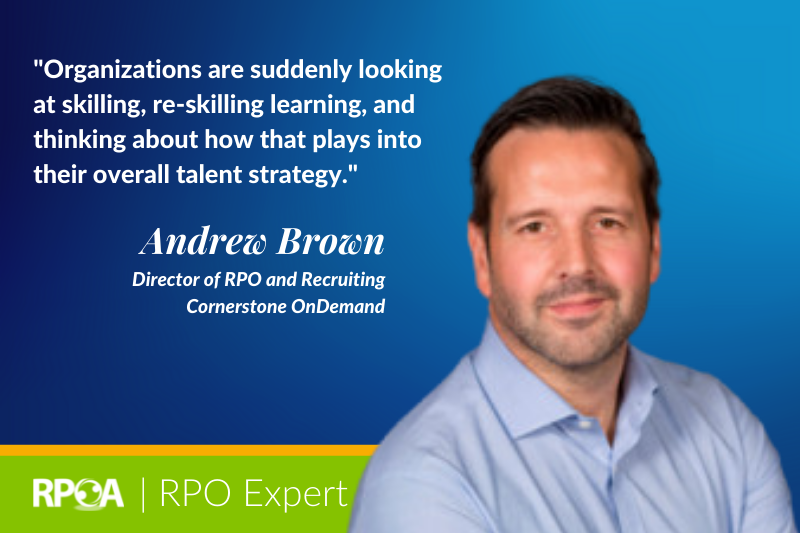
Organizations are finding innovative ways to squash the tsunami of disruptions that have hit the talent market. The COVID-19 pandemic, BREXIT, and an extreme talent shortage have created a candidate-driven market, a wage bubble for recruiters, and a new perspective on total talent acquisition. As a member of the RPO Expert Series, Andrew Brown, Director of RPO and Recruiting at Cornerstone OnDemand, talked with RPOA’s Executive Director, Lamees Abourahma, about the recent turbulence in the labor market and the innovative ways companies are quieting the storm. Below is an edited version of that interview.
Brown has supported partners across RPO and MSP platforms by delivering innovative technology for almost 15 years. As the Director of RPO and Recruiting, he works with partners and customers on technology solutions to support their total talent solutions.
RPOA: How has the talent shortage and the pandemic affected the labor market and hiring in different regions in the past couple of years?
Brown: It's no secret that there's a shortage of talent -- a shortage of skills. And over the last couple of years, the pendulum of power has swung to the candidate from the employer. So now, candidates have many more options. And the pandemic has created this pendulum shift because, during that time, many organizations shifted to remote working. For example, in the UK, public sector organizations have traditionally had the pick of local talent, the pick of talent within their sort of catchment area if you like. So when the pandemic came along, and everyone started working remotely, these same employees who typically work for their local town or local authority, we see jobs available hundreds of miles away remotely for more money -- for London wages -- for higher compensation. And that started to impact organizations that had traditionally benefited from taking the pick of the local talent and skill sets.
How has BREXIT affected hiring and the talent dynamics in Europe and the UK?
Brown: We (as in the UK) exited the European Union mid-pandemic. And the hospitality sector was obliterated during those times. There were huge numbers of people on furlough, a huge number of people who weren't able to leave the house or weren't able to work because restaurants and coffee shops were closed. And even where they were open, they didn’t have the footfall they were used to because of the closed offices. Then the pandemic twinned with Brexit, and all of a sudden, laborers had to return to Europe or weren't interested in completing any sort of visa applications or cutting through the red tape that ultimately the British government put in front of them. Both of those elements put a heavy strain on the hospitality sector.
The pandemic and BREXIT impacted the aviation sector. The pandemic forced aviation organizations to cut headcount. They couldn't run with the number of baggage handlers or maintenance crew sizes. Brexit affected organizations' willingness to hire. It also involved labor that moved back into Europe to work in a more employee-centric, open border environment.
I would say that the hospitality sector bounced back pretty quickly. But you can see remnants of the damage done. The pandemic and BREXIT are being felt. I think there are 250 flights a day being canceled across the UK. The pandemic and BREXIT are being felt.
It gives you a sense that despite being out of the pandemic and Brexit being done 18 months ago, you know, we're starting to see some repercussions from both of those things.
Recruiters are in high demand. Wages are at a record high. Do you see this issue going away anytime soon, and why?
Brown: Yes, I do. I think it's a bubble. The willingness for companies to spend huge amounts on finding good recruiters creates a bubble. Recruiters suddenly became a high commodity. I know examples in the UK where recruiters, in-house recruiters, suddenly moved to different organizations for four times their salary. So, as a recruiter, I will go where the money is; of course, I will take the opportunity.
It would make me nervous as a recruiter going to an organization for huge sums of money because when things settle down when talent becomes more widely available, those numbers I'm earning will stand out like a sore thumb on the books. So it would make me nervous.
I think it's a bubble, and we'll see a shift in the UK, or dare I say, globally, because we are heading towards a recession. The impact of inflation, the current labor market, the pandemic, BREXIT, and the war in Ukraine are driving us into a recession.
Employers could suddenly introduce a hiring freeze again. And as a result, that could give the power back to the employer rather than the employee. Will we see companies cutting staff or employee numbers to tackle inflation and a recession? Or will we see them embrace it, retain workers continue to hire through it, and almost buy their way out of a recession.
The pendulum of power will swing back from the candidate to the employer. And as we go through difficult times, most candidates during a recession want to find work very quickly and have a safeguard through full-time employment. They won't wait for the best job to come along. They will take a job given the current financial constraints dictate. So, I think it will be interesting over the next year or 18 months whether all of those things combined to shift that pendulum or power back to the employer. But my personal opinion will be that the candidate will lose.
How have the current disruptions affected total talent acquisition?
Brown: There's been a bit of a big rise in organizations wanting a statement of work (SOW) rather than just other types of programs. Organizations are more willing to say, 'find me the right talent, irrespective of whether it's a gig, a contractor, or a full-time employee.' This concept of work over jobs drives that mindset. Organizations are focused on fulfilling the work, and it doesn't matter how you fulfill that work, as long as the work gets done.
So we have seen organizations embracing a much more openness to breaking down those traditional silos of HR versus procurement when it comes to permanent versus contingent workforce. These organizations have said, 'Let's just find the right skill to address this piece of work.' And we've seen it with the gig economy. Remote working has become the norm that drives people to dip out of organizations and do piece work here and there. Many things are pointing towards the emergence of the total talent model. I think it will continue, especially while the skill shortage continues. And it will continue while organizations solve for work rather than traditional jobs and careers.
In general, how are companies solving these disruptions?
Brown: In recent months, I've seen many organizations move towards internal mobility programs, succession planning, learning, and skilling. Many organizations need support in terms of addressing the skill shortage. They've tried going out to the market and can't fulfill the positions, the roles they have. And so, some organizations are going back to basics. They're looking at their employer branding and saying, 'Okay, how do we revisit our employer branding? How do we make this employer brand now more relevant to a wider audience? How do we compete with those companies that are hiring remotely?'
Commitment to skilling- to growing an employee started to take off. Organizations are looking internally to fill those hard-to-fill roles. Organizations are suddenly looking at skilling, re-skilling learning, and thinking about how that plays into their overall strategy. But I think what's interesting is how many organizations now are going for potential talent rather than the finished article? And that is where it starts to become quite compelling around how organizations will hire for the needed skills? Or the skills that a candidate potentially has. And how do we educate them to make the most of those skills? Or how do we finish the final 10% of the skills they need to do this job?
Talent acquisition has never been as important as it is, especially with the skill shortage. But there are many private sector organizations with deep pockets willing and able to pay candidates a lot more than public sector organizations. Organizations that don't have the money to pay candidates large sums of money will need to find other ways to attract talent.
For me, a super compelling way to compete with organizations with big pockets is that commitment to skilling and re-skilling existing talent to address that demand. And I think that opens up an exciting conversation around RPO. How can RPO get involved in internal mobility programs? I've seen some great examples of organizations supporting internal mobility programs in the UK and across Europe.
What excites me most is bringing all the elements organizations to need together in one place. So how will I attract the right talent? How will I identify the right tech talent internally if I can't attract the right talent? How will I set them on a path to achieve what they want and address the skills gap? And that's through learning--through skilling. And then how do we bring all those things into one sort of talent marketplace. If you'd like to mirror the future with your current workforce, develop a path to achieve that.
How has technology helped companies solve the current disruptions in the labor market?
Brown: Organizations have had to change how they usually do things to attract and hire people. They use technology for skilling, skills assessment, succession planning, gap analysis, and internal mobility. Also, the use of video technology increased during the pandemic.
We saw a lot of companies using video technology during the pandemic. I thought this reliance on video technology would stop after the pandemic, but it hasn't. Even companies that didn't trust video technology have learned to use it and found that it can add a lot of value.
Technology has helped companies find the best employees. Technology has made it possible for companies to rebuild their internal mobility programs. Companies that have not done well in finding new talent or future employees are now looking at how technology like campaigns and CRM can positively influence filling potential roles. Using technology, companies can solve for finding new employees and build the internal workforce.
Organizations have also been using talent technology to figure out what they're doing right and wrong? They're reviewing their employer branding and determining whether they're attracting the type of people they want for their organizations. They want to know how they can get a bigger net of candidates—maybe making it a bit softer in terms of the approach.
We've also seen the emergence of TikTok and Instagram regarding job posting. Some good companies position jobs on Instagram but reach a completely different audience.
Many organizations are putting a huge amount of emphasis now on culture. Whereas before, culture wasn't something the organization's talked about. Cultural fit is high on the agenda when building an employer branding proposition. And candidates looking for roles see your organization in a search, visit your career site. Does your company give those candidates a good sense of what culture they're walking into? Does it provide them with a sense of what value your company can bring?
For more insights from other RPO and TA Experts, check out our RPO Expert Series on the RPO Voice blog with interviews with top talent acquisition experts.






-min.jpg)







